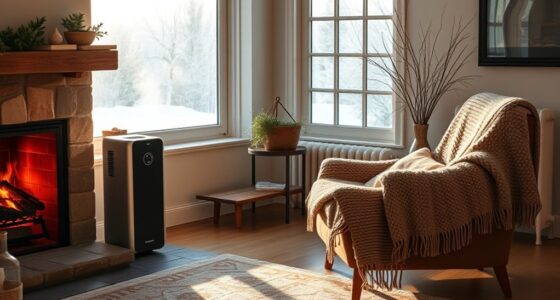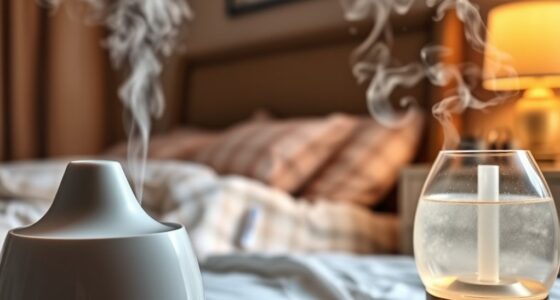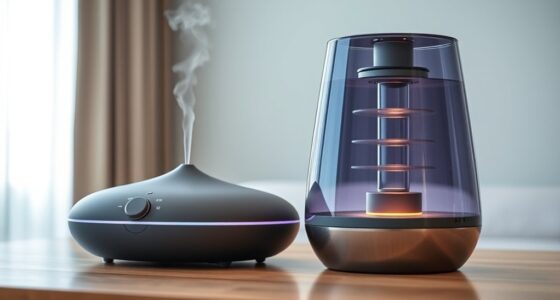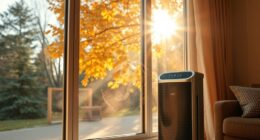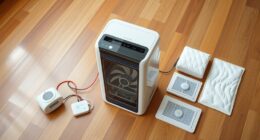Dry air in winter can silently harm your health by causing skin dryness, irritation, and respiratory issues like sore throats and congestion. It weakens your skin’s natural barrier and exacerbates conditions like eczema or psoriasis. Indoor dryness also irritates your nasal passages and lungs, making breathing uncomfortable. Over time, mold and dust mites may thrive if humidity isn’t controlled. Staying aware of these hidden risks can help protect your well-being—keep exploring to see how humidifiers can make a difference.
Key Takeaways
- Dry indoor air can impair respiratory health, causing irritation and increasing susceptibility to infections.
- Low humidity damages skin, leading to dryness, itching, and worsening of skin conditions like eczema.
- Insufficient moisture can cause nasal congestion, sore throats, and breathing difficulties.
- Dry air increases static electricity and can damage wooden furniture and musical instruments.
- Overly dry environments promote mold growth and dust mites if humidity exceeds recommended levels.

During winter, dry indoor air often seems harmless, but it can pose serious health risks you might not immediately notice. When the air lacks moisture, your body struggles to maintain normal functions, leading to discomfort and potential health issues. One effective way to counteract this dryness is by using humidifiers. The benefits of humidifiers extend beyond simply adding moisture to the air; they help improve overall indoor air quality and comfort. By increasing humidity levels, humidifiers create a healthier environment, especially when outdoor air is cold and dry.
A key benefit of humidifiers is their ability to enhance skin hydration. During winter, low humidity can strip moisture from your skin, causing it to become dry, flaky, and itchy. This dryness can lead to irritation and even exacerbate skin conditions like eczema or psoriasis. Using a humidifier helps maintain your skin’s natural barrier, locking in moisture and keeping it supple. When your skin stays well-hydrated, you not only feel more comfortable but also reduce the chances of developing cracks or irritation that can invite infections. It’s a simple step that can profoundly improve your skin’s health during the cold months.
Beyond skin health, maintaining proper humidity levels can also alleviate respiratory issues. Dry air irritates your nasal passages, throat, and lungs, making you more susceptible to colds, coughs, and sore throats. Humidifiers add necessary moisture to the air, which can soothe these sensitive areas, making it easier to breathe and sleep better. They can also reduce static electricity and prevent wooden furniture or musical instruments from cracking due to overly dry conditions. Additionally, awareness of indoor air quality can guide you to optimize humidity levels for better health outcomes.
However, it’s essential to use humidifiers correctly. Over-humidification can lead to mold growth and dust mites, which can worsen respiratory problems. Keep indoor humidity ideally between 30-50%, and clean your humidifier regularly to prevent bacterial buildup. By doing so, you maximize the benefits of humidifiers and avoid potential risks. Staying vigilant about indoor moisture levels ensures you reap the benefits of improved skin hydration and overall health.
Frequently Asked Questions
Can Dry Air Worsen Existing Respiratory Conditions?
Dry air can definitely worsen your existing respiratory conditions. It causes airway irritation, making your breathing more uncomfortable, and promotes mucus buildup, which can block airways further. When the air lacks humidity, your respiratory system struggles to stay moist, increasing symptoms like coughing and wheezing. To protect yourself, consider using a humidifier or staying hydrated, helping to keep your airways clear and reduce irritation.
Does Dry Indoor Air Affect Sleep Quality?
Imagine a silent thief stealing your restful nights—dry indoor air can do just that. It dries out your nasal passages, making it harder to breathe comfortably, which disrupts your sleep. Using humidifiers benefits your sleep environment by adding moisture, helping you breathe easier and enjoy deeper, more restorative sleep. Don’t let dry air rob you of quality rest; embrace humidifiers to create a cozy, balanced sleep setting.
Are There Long-Term Health Effects From Winter Dry Air?
You might wonder if winter dry air causes long-term health issues. Low indoor humidity can weaken your respiratory system and make you more vulnerable to airborne pollutants. Over time, this can lead to chronic respiratory problems, allergies, or asthma flare-ups. Maintaining proper indoor humidity helps protect your health by reducing airborne pollutants and keeping your respiratory system strong, preventing these long-term effects.
How Does Dry Air Influence Skin Aging During Winter?
During winter, dry air causes your skin to become dehydrated, leading to a loss of elasticity and the development of fine lines. As your skin struggles to retain moisture, wrinkles form more easily and age your appearance prematurely. You can counter this by using moisturizers and staying hydrated, which helps reduce skin dehydration and slows wrinkle formation. Protecting your skin from harsh winter conditions is key to maintaining a youthful glow.
Can Dry Air Cause or Worsen Allergies in Winter?
Did you know that dry air can increase allergy symptoms by up to 25%? When you breathe in dry air, it can dry out your nasal passages, making allergy triggers like dust and pet dander more irritating. Using humidifiers helps maintain healthy humidity levels, reducing allergy triggers and supporting your overall health. Proper humidification can make winter allergies less severe and help you breathe easier during the cold months.
Conclusion
As winter’s dry air sneaks in, you might not realize it’s affecting your health. Dry air can cause respiratory issues, skin irritation, and even increase your risk of colds. Did you know that indoor humidity levels below 30% can make you up to 50% more susceptible to infections? By maintaining proper humidity and staying aware, you can protect yourself and enjoy a healthier winter. Don’t let dry air catch you off guard—take action today!


